
Willow Grove is a settlement in New Brunswick, Canada, [1] that was founded in 1815 [2] or 1817 [3] by Black refugees from the United States. [3] It is located in Simonds Parish in Saint John County.

Willow Grove is a settlement in New Brunswick, Canada, [1] that was founded in 1815 [2] or 1817 [3] by Black refugees from the United States. [3] It is located in Simonds Parish in Saint John County.
The majority of residents of Willow Grove were freed American slaves who were granted freedom in exchange for fighting for the British in the War of 1812. [3]
Alexander Cochrane, the commander in chief of the Royal Navy in North America stated in 1814 that "All those who may be disposed to emigrate from the United States will, with their families, be received on board of His Majesty's ships or vessels of war, or at the military posts that may be established, upon or near the coast of the United States." [2] The Government of the United Kingdom's initial plans to provide land to Black loyalists was thwarted by the Government of Nova Scotia, who did not want more Black residents. [2] The UK government next sought support from the Government of New Brunswick. [2] New Brunswick Administrator Major General Stracey Smyth brought the matter to the Executive Council, and "Although the Council agreed by a vote of 3 to 2 to accept the refugees, the New Brunswick government was very reluctant to assume any responsibility for their welfare." [2] Thousands of loyalists were accepted, of which 371 went to Willow Grove, having been promised fertile land for farming. [2] The 50 acre plots given to the Black residents less than the 100 acre plots given to white arrivals from the US and the land in Willow Grove was not fertile. [3]
Willow Grove is the location of the Black Settlement Burial Ground. [4] Along with Amber Valley, Alberta, Willow Grove was featured on a Canadian postage stamp celebrating Black History Month in 2021. [3]

United Empire Loyalists is an honorific title which was first given by the 1st Lord Dorchester, the Governor of Quebec, and Governor General of The Canadas, to American Loyalists who resettled in British North America during or after the American Revolution. At the time, the demonym Canadian or Canadien was used to refer to the indigenous First Nations groups and the descendants of New France settlers inhabiting the Province of Quebec.
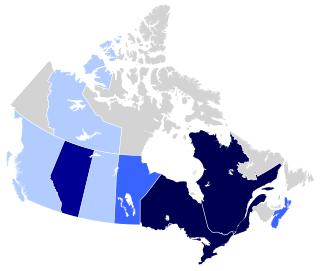
Black Canadians, also known as Afro-Canadians, are people of full or partial sub-Saharan African descent who are citizens or permanent residents of Canada. The majority of Black Canadians are of Caribbean and African immigrant origin, though the Black Canadian population also consists of African American immigrants and their descendants. Black Canadian migration from Africa has risen substantially since 2011.

Perth-Andover is a former village in Victoria County, New Brunswick, Canada. It held village status prior to 2023. It is now part of the village of Southern Victoria.

Loyalists were colonists in the Thirteen Colonies who remained loyal to the British Crown during the American Revolutionary War, often referred to as Tories, Royalists or King's Men at the time. They were opposed by the Patriots, who supported the revolution, and called them "persons inimical to the liberties of America."
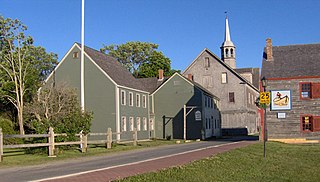
Shelburne is a town located in southwestern Nova Scotia, Canada.
The history of Fredericton stretches from prehistory to the modern day. Fredericton, New Brunswick was first inhabited by the Mi'kmaq and Maliseet peoples. European settlement of the area began with the construction of Fort Nashwaak by the French in 1692. In 1783, the United Empire Loyalists settled Ste. Anne's Point, and in the next year, renamed the settlement Frederick's Town. The name was later shorted to Fredericton in April 1785.
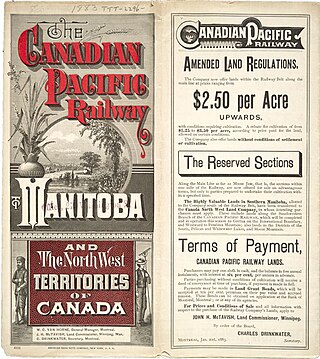
A block settlement is a particular type of land distribution which allows settlers with the same ethnicity to form small colonies. This settlement type was used throughout western Canada between the late 19th and early 20th centuries. Some were planned and others were spontaneously created by the settlers themselves. As a legacy of the block settlements, the three Prairie Provinces have several regions where ancestries other than British are the largest, unlike the norm in surrounding regions.

Grand Bay-Westfield is a town on the west bank of the Saint John River immediately north of the boundary between Kings County and Saint John County of New Brunswick, Canada.

Amber Valley is an unincorporated community in northern Alberta, Canada, approximately 160 kilometres (99 mi) north of Edmonton. Its elevation is 608 m (1,995 ft). Originally named Pine Creek, Amber Valley was among several Alberta communities settled in the early 20th century by early Black immigrants to the province from Oklahoma and the Deep South of the United States. About 1,000 African Americans emigrated to Alberta from 1909-1911. Amber Valley is the location of the Obadiah Place provincial heritage site, a homestead of one of the first African-American settler families.
American Canadians are Canadians of American descent. The term is most often used to refer to Canadians who migrated from or have ancestry from the United States.
Thomas Peters, born Thomas Potters, was a veteran of the Black Pioneers, fighting for the British in the American Revolutionary War. A Black Loyalist, he was resettled in Nova Scotia, where he became a politician and one of the "Founding Fathers" of the nation of Sierra Leone in West Africa. Peters was among a group of influential Black Canadians who pressed the Crown to fulfill its commitment for land grants in Nova Scotia. Later they recruited African-American settlers in Nova Scotia for the colonisation of Sierra Leone in the late eighteenth century.
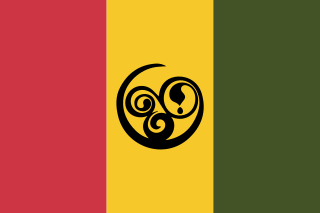
Black Nova Scotians are Black Canadians whose ancestors primarily date back to the Colonial United States as slaves or freemen, later arriving in Nova Scotia, Canada, during the 18th and early 19th centuries. As of the 2021 Census of Canada, 28,220 Black people live in Nova Scotia, most in Halifax. Since the 1950s, numerous Black Nova Scotians have migrated to Toronto for its larger range of opportunities. Before the immigration reforms of 1967, Black Nova Scotians formed 37% of the total Black Canadian population.
Maugerville is a New Brunswick unincorporated community located on the east bank of the Saint John River in Maugerville Parish, Sunbury County, in the Canadian province of New Brunswick. The settlement is located on provincial Route 105, 16 kilometres southeast of the capital city of Fredericton and 3.18 kilometres northeast of the town of Oromocto.

During the American Revolution, those who continued to support King George III of Great Britain came to be known as Loyalists. Loyalists are to be contrasted with Patriots, who supported the Revolution. Historians have estimated that during the American Revolution, between 15 and 20 percent of the white population of the colonies, or about 500,000 people, were Loyalists. As the war concluded with Great Britain defeated by the Americans and the French, the most active Loyalists were no longer welcome in the United States, and sought to move elsewhere in the British Empire. The large majority of the Loyalists remained in the United States, however, and enjoyed full citizenship there.
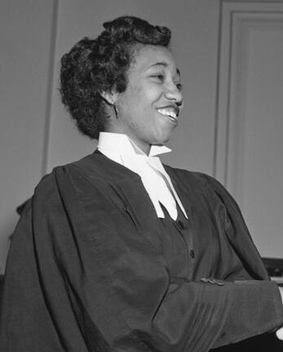
Violet Pauline King Henry was the first black woman lawyer in Canada, the first black person to graduate law in Alberta and the first black person to be admitted to the Alberta Bar. She was also the first woman named to a senior management position with the American national YMCA.
The African-American diaspora refers to communities of people outside of the United States who are descended from people of African descent who were enslaved in the United States or its preceding European colonies along the east coast of North America.

Interprovincial migration in Canada is the movement by people from one Canadian province or territory to another with the intention of settling, permanently or temporarily, in the new province or territory; it is more-or-less stable over time. In fiscal year 2019–20, 278,316 Canadians migrated province, representing 0.729% of the population.

Black Canadians have lived in New Brunswick since at least the 1690s. As of 2021, there were 12,100 Black residents in New Brunswick, making them the largest visible minority group in the province.
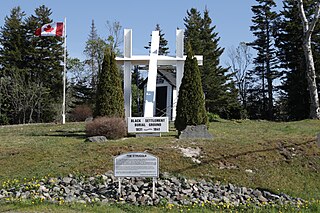
Black Settlement Burial Ground, is a cemetery in Willow Grove, near Saint John, New Brunswick, Canada.

The New Brunswick Black History Society (NBBHS) is an organization based in New Brunswick, Canada which is dedicated to researching, documenting, and preserving Black history in the province.